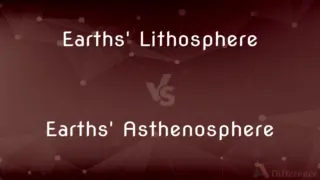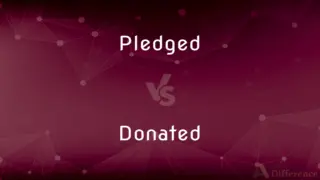Anticipate vs. Envisage — What's the Difference?
By Tayyaba Rehman & Urooj Arif — Updated on May 8, 2024
Anticipate involves preparation or action in expectation of an event; envisage focuses on mentally picturing or contemplating future possibilities.

Difference Between Anticipate and Envisage
Table of Contents
ADVERTISEMENT
Key Differences
Anticipate implies an active preparation or readiness for what is expected to occur. For example, one might anticipate a storm by boarding up windows. On the other hand, envisage primarily deals with imagining or foreseeing something that might not necessarily lead to immediate action.
Anticipation often involves taking precautionary measures based on previous experiences or clear signs pointing to a likely event. Whereas, envisage can be more speculative, involving detailed mental visualizations of scenarios that are possible but not guaranteed.
While anticipate can carry a sense of urgency or proactive behavior, envisage tends to be more passive, focusing on conceptual understanding or theoretical scenarios. This difference often influences how individuals or organizations plan for future events.
In some contexts, anticipate can also mean to deal with something ahead of time, like anticipating questions in a presentation. Conversely, envisage does not imply any preemptive action but rather a contemplative process.
Anticipate also carries an emotional connotation, often being associated with looking forward to something eagerly. Envisage, however, is neutral, concerned solely with the mental image of future possibilities without an emotional aspect.
ADVERTISEMENT
Comparison Chart
Focus
Preparation and readiness
Mental visualization
Action vs. Contemplation
Involves proactive measures
More about contemplation and speculation
Usage Context
Often used in practical, urgent scenarios
Used in theoretical or imaginative contexts
Emotional Connotation
Can imply eagerness or dread
Generally emotionally neutral
Example Context
Anticipating a question in a meeting
Envisaging a new technology’s impact
Compare with Definitions
Anticipate
To look forward to, especially with pleasure.
He is anticipating the upcoming holiday.
Envisage
To view in a certain way.
He envisages the project as a potential breakthrough.
Anticipate
To act in advance to prevent or mitigate.
They anticipated the traffic and left early.
Envisage
To contemplate or consider a possible future event.
She envisaged spending her retirement abroad.
Anticipate
To take into consideration in advance.
The architect anticipated the need for more space in the design.
Envisage
To predict or foresee something.
The economist envisaged an economic downturn.
Anticipate
To foresee and act before another.
The company anticipated their competitors by launching the product early.
Envisage
To form a mental image of something not present.
The inventor envisaged the future of transport.
Anticipate
To expect or predict.
She anticipated the crowd's needs and opened more registers.
Envisage
To mentally prepare for a particular scenario.
They envisaged all possible outcomes before making a decision.
Anticipate
Regard as probable; expect or predict
She anticipated scorn on her return to the theatre
It was anticipated that the rains would slow the military campaign
Envisage
Contemplate or conceive of as a possibility or a desirable future event
The Rome Treaty envisaged free movement across frontiers
Anticipate
Act as a forerunner or precursor of
He anticipated Bates's theories on mimicry and protective coloration
Envisage
To conceive an image or a picture of, especially as a future possibility
Envisaged a world at peace.
Anticipate
To see as a probable occurrence; expect
We hadn't anticipated the crowds at the zoo. I anticipated that you might be in a hurry.
Envisage
To consider or regard in a certain way.
Anticipate
To think of (a future event) with pleasure; look forward to
She anticipated a pleasant hike in the country.
Envisage
To conceive or see something within one's mind; to imagine or envision.
Anticipate
To deal with beforehand; act so as to mitigate, nullify, or prevent
We anticipated the storm by boarding up the windows.
Envisage
To look in the face of; to apprehend; to regard.
From the very dawn of existence the infant must envisage self, and body acting on self.
Anticipate
To react to (someone) abruptly, especially to prevent someone from continuing or progressing
"Immediately he regretted his words and started to add.
Envisage
Form a mental image of something that is not present or that is not the case;
Can you conceive of him as the president?
Anticipate
To act in a way that blocks or vitiates the action of (another)
"Professor Thomson had anticipated me and had obtained many patents on this principle" (Nikola Tesla).
Anticipate
To serve as a forerunner to or previous indication of
Her research in the previous decade anticipated these findings.
Anticipate
To use in advance, as income not yet available.
Anticipate
To pay (a debt) before it is due.
Anticipate
To think, speak, or write about a matter in advance.
Anticipate
(transitive) To act before (someone), especially to prevent an action.
Anticipate
To take up or introduce (something) prematurely.
The advocate plans to anticipate a part of her argument.
Anticipate
To know of (something) before it happens; to expect.
To anticipate the pleasures of a visit
To anticipate the evils of life
Please anticipate a journey of an hour from your house to the airport
Anticipate
To eagerly wait for (something)
Little Johnny started to anticipate the arrival of Santa Claus a week before Christmas.
Anticipate
To be before in doing; to do or take before another; to preclude or prevent by prior action.
To anticipate and prevent the duke's purpose.
He would probably have died by the hand of the executioner, if indeed the executioner had not been anticipated by the populace.
Anticipate
To take up or introduce beforehand, or before the proper or normal time; to cause to occur earlier or prematurely; as, the advocate has anticipated a part of his argument.
Anticipate
To foresee (a wish, command, etc.) and do beforehand that which will be desired.
Anticipate
To foretaste or foresee; to have a previous view or impression of; as, to anticipate the pleasures of a visit; to anticipate the evils of life.
Good with badExpect to hear; supernal grace contendingWith sinfulness of men.
I would not anticipate the relish of any happiness, nor feel the weight of any misery, before it actually arrives.
Timid men were anticipating another civil war.
Anticipate
Regard something as probable or likely;
The meteorologists are expecting rain for tomorrow
Anticipate
Act in advance of; deal with ahead of time
Anticipate
Realize beforehand
Anticipate
Make a prediction about; tell in advance;
Call the outcome of an election
Anticipate
Be excited or anxious about
Anticipate
Be a forerunner of or occur earlier than;
This composition anticipates Impressionism
Common Curiosities
Is envisage always about positive future outcomes?
No, envisage can involve any future scenario, whether positive or negative, without an emotional bias.
Can you use 'anticipate' when referring to negative events?
Yes, you can anticipate both positive and negative events, preparing for them accordingly.
Is anticipate only used for tangible events?
Mostly, though it can also refer to preparing mentally for intangible events like reactions or changes.
What does it mean to anticipate an event?
To anticipate an event means to prepare for it or expect it before it happens.
Do both terms involve action?
Anticipate often involves taking proactive steps, whereas envisage is more about mental contemplation.
Can one envisage a past event?
Typically, envisage is forward-looking, focusing on future possibilities rather than past events.
How is envisage used differently from anticipate?
Envisage is used to mentally picture or contemplate future scenarios, without necessarily taking action.
What is a key difference in the emotional tone between anticipate and envisage?
Anticipate can carry emotional tones such as eagerness or anxiety, whereas envisage is typically neutral.
Can envisage be used in business planning?
Yes, envisage is often used in business to conceptualize future products or strategies.
How do anticipate and envisage differ in usage in a crisis situation?
In a crisis, anticipate would refer to immediate and proactive steps taken, while envisage would involve conceptualizing long-term impacts and responses.
Which term is more likely to be used in a scientific context?
Envisage might be more common in scientific contexts that involve predictions and modeling future scenarios.
Share Your Discovery

Previous Comparison
Stola vs. Chiton
Next Comparison
Dysregulated vs. DisregulatedAuthor Spotlight
Written by
Tayyaba RehmanTayyaba Rehman is a distinguished writer, currently serving as a primary contributor to askdifference.com. As a researcher in semantics and etymology, Tayyaba's passion for the complexity of languages and their distinctions has found a perfect home on the platform. Tayyaba delves into the intricacies of language, distinguishing between commonly confused words and phrases, thereby providing clarity for readers worldwide.
Co-written by
Urooj ArifUrooj is a skilled content writer at Ask Difference, known for her exceptional ability to simplify complex topics into engaging and informative content. With a passion for research and a flair for clear, concise writing, she consistently delivers articles that resonate with our diverse audience.















































